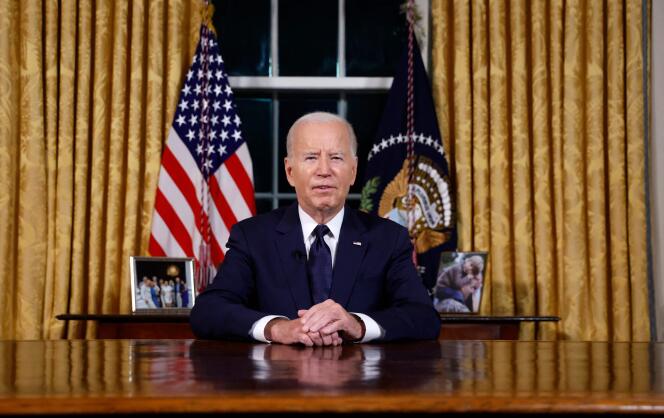


Joe Biden's solemn address – given the day after his trip to Israel – seemed like an uphill battle, given the current political, diplomatic, and domestic pressures. Over the course of just 15 minutes, speaking from the Oval Office of the White House on Thursday, October 19, the Democratic president tried to hold an increasingly isolationist America to its global responsibilities: "American leadership is what holds the world together," he declared.
To be convincing – and also for domestic political reasons – he had to show a link between the war in Ukraine and the conflict between Israel and Hamas and, in other words, to push the vote for a package of foreign financial aid of over $100 billion (€95 billion) by Congress. The Republicans, who hold a majority in the House of Representatives, no longer want to fund Ukraine ($60 billion), but it's hard for them to shy away from aiding the Jewish state ($14 billion). In the absence of a Republican speaker in the House of Representatives, due to divisions in the Grand Old Party (GOP), the legislative process is stalled for the time being.
Occasionally artificially connecting the two conflicts, Biden presented himself as a courageous president, having once again visited a war zone, as he had done on his secret train journey to Kyiv in February 2023. He described the atrocities carried out by both enemies – the abduction of Ukrainian children by the Russian army and the crimes of Hamas terrorists. And he deduced the need for action: "History has taught us that when terrorists don't pay a price for their terror, when dictators don't pay a price for their aggression, they cause more chaos and death and more destruction."
Biden's America is back, but not on the ground. The President reiterated that there was no intention of deploying American troops in Ukraine. The quid pro quo for that is to arm allies: "It's a smart investment that's going to pay dividends for American security for generations, help us keep American troops out of harm's way."
The second, diplomatic, challenge is to strike a balance between supporting the Israelis and offering hope to the Palestinians. Biden once again called on Israel not to repeat the mistakes the Americans made after the attacks of September 11, 2001.
Explaining that Hamas had "unleashed pure, unadulterated evil" and that "it did not represent the Palestinian people," the president placed great emphasis on Palestinians' pain, something he had been slow to do after Israel's initial retaliation. "I am heartbroken by the tragic loss of Palestinian life, including the explosion at a hospital in Gaza — which was not done by the Israelis," he said. "We can't ignore the humanity of innocent Palestinians who only want to live in peace and have an opportunity."
You have 26.89% of this article left to read. The rest is for subscribers only.
